Text

Requested by anon
38 notes
·
View notes
Text
We need to look beyond the concept of the "morally gray"
I don't like the concept of "morally gray" characters because it still basically portrays morality as binary, or, if you don't want to call it "binary," linear. There are good actions and bad actions, good people and bad people, and sure, there might be some stuff in the middle, but all that can still basically be understood in terms of the relation to good and bad.
Because, of course, while we might struggle to understand these people in the "gray areas," no one struggles to categorize our more typical heroes and villains. The beautiful, righteous, trueborn king is obviously good, and the evil, selfish usurper is obviously bad.
That's what the narrative tells us. But I need people to take a step back from the narrative role that has been assigned and actually evaluate the values and actions of the characters. Because when you do that, you begin to see that almost every character can be characterized as "morally gray." And it's here that we see the concept begin to collapse in on itself.
Because good and evil aren't static, defined, objective things, let alone easy to identify at a glance. And if good and evil aren't serving as the anchors at either end of the line, the spectrum itself cannot function.
I don't believe that "good" and "evil" are totally useless concepts. (Though even if they were, it would be difficult to get away from them with how entrenched this concept model is in our society.) But if we're going to have any sort of interesting discussion here, we need to start talking about morality in subjective, not objective, terms.
This is my other issue with the idea of the "morally gray" character—they might be morally gray to you, but I might think they're pretty cut and dry good or evil. One example is characters who are criminals. Most media and most analysis will tend to portray them as "morally gray" simply because of their criminal status. Sorry, but that's a you problem. You may hold that lawfulness is inherently good and unlawfulness inherently evil, but I don't. If a law is unjust, it is morally correct to defy it.
You're welcome to disagree with me, of course. But at some level we all have to accept that there can be disagreement. Morality is inherently one of the most controversial topics in existence and we are not all going to immediately agree, which is why it drives me up the wall when people try to categorize fictional characters in such overly simplistic ways.
The idea of the "morally gray" reinforces the idea that although we might quibble on some details, we all basically agree on what's right and what's wrong. There might be a particularly odd person, or a particularly complex, entangled situation, but for the most part, we all know what's good and what's bad, right, guys?
If we really opened up the discussion, I think people would be shocked by how deep some of these disagreements go. And it's only when we actually start talking about this stuff that we can begin to sift through and find the truth (or as close to the truth as we can get in this world).
The funny thing about the term "morally gray" is that the limitations are pretty self-evident from the metaphor. Sure, you've upgraded from black and white, but you've decided to stop at grayscale. There's hardly even much of a difference! We need the full visual spectrum of colors here.
I think that there was perhaps a time when the idea of "morally gray characters" served a purpose. After all, we are not so far removed from the era of the Hays Code. It was once controversial to even show what was deemed taboo or immoral by mainstream moral authorities. The advent of the "morally gray" character surely did bring greater detail and subtlety to the portrayal of morality in media. But the world has continued to change. We need to press even harder and demand that different moral perspectives be allowed to exist in media and that we be allowed to fully explore those perspectives in our analyses.
0 notes
Text
Everyone is weak. That's why we cling to one another. To our dreams. To a word of comfort. To a strict command.
Casca, Berserk (1997), Episode 23: "Eve of the Feast"
6 notes
·
View notes
Text
Come. You could...come with me. I don't know what will happen. I only know one thing, that I want to keep holding you, lie with you a hundred more—no, a thousand more times. That's how I feel.
Guts, Berserk (1997), Episode 21: "Confession"
0 notes
Text
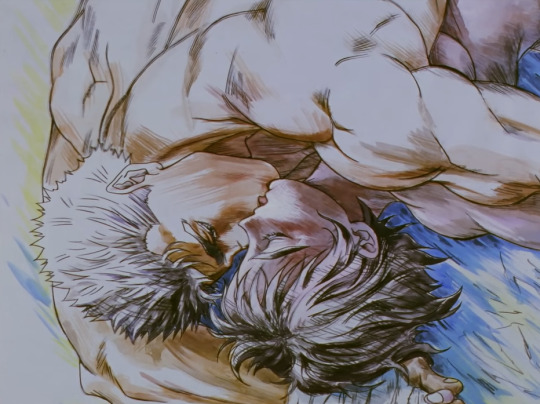
The life I had led since the moment I met Griffith all at once felt betrayed. My life has been an honest one. I have only my pride, and I owe that to Griffith. But...I'm changing. There may be a place for me in this man's soul. Not because of what I may receive, but for something of worth I may have for him.
7 notes
·
View notes
Text
In my mind, a true friend never relies on another's dream. The man who would be my friend must have his own reason for living, beyond me. And he should put his heart and soul into protecting his dream. He should never hesitate to defend it. Even against me.
Griffith, Berserk (1997), Episode 10: "Nobleman"
2 notes
·
View notes
Text
I'm too old to be fantasizing about fictional characters murdering me. And yet
1 note
·
View note
Text

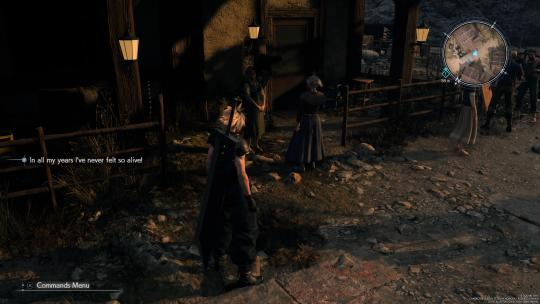
How it feels to play a Final Fantasy VII game for the first time
19 notes
·
View notes
Text

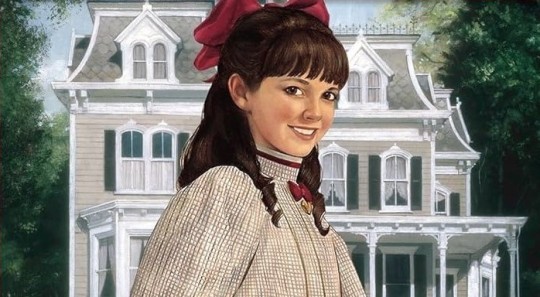

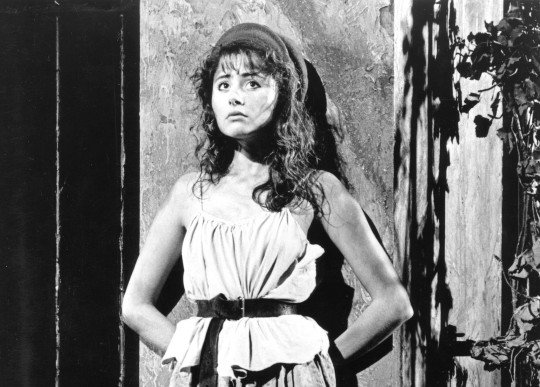
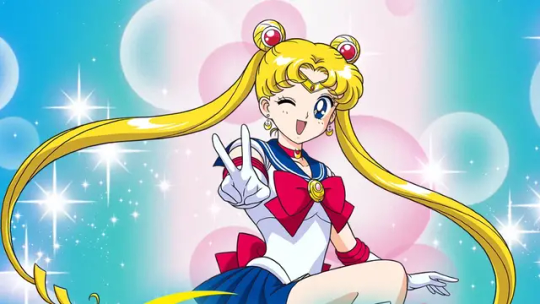





Late, but I wanted to post some of my favorite girl/woman fictional characters for International Women's Day.
#image#art#media#characters#character#women#International Women's Day#Ariel#Samantha Parkington#Poison Ivy#Éponine Thénardier#Tsukino Usagi#Kou Seiya#Kawajiri Shinobu#Jolyne Cujoh#Lenore Vandernacht#Mina Murray
10 notes
·
View notes
Text
The "Story of Hell" doesn't make sense

If humanity didn't have free will, how was Adam able to defy Heaven by commanding Lilith to obey him when the two were intended by Heaven to be equals? And how was Lilith able to refuse him? Both of these actions sure sound like people exercising free will.
The story says that when Eve bit the apple, evil found its way into Earth. Why is Adam trying to force Lilith into being subservient not considered an act of evil? Or, alternately, let's say that this universe just condones patriarchy. Then, why wouldn't Lilith's resistance be considered evil?
Why did Eve need to bite the apple? Lilith is as human as Eve is. If Lucifer and Lilith wanted humanity to have free will, why not just have Lilith eat the apple?
"Ashamed, Lucifer lost his will to dream, but Lilith thrived." So like...is Lilith just evil? Lucifer is understandably extremely upset that both Earth and Hell are now full of suffering, and he blames himself, falling into a deep depression. Why does Lilith not care at all? Is she literally just power-hungry and enjoys having a realm of her own to rule and superpowered citizens to command?
What exactly is Lilith's "dream"? Charlie says that Lilith's dream was passed down to her, but Lilith is only ever shown to be interested in developing Hell and increasing its power, not redeeming sinners and sending them to Heaven. Why does Charlie believe that what she's doing is what Lilith wants?
This storybook raises far more questions than it answers and just left me kind of lost as to how events occurred and how this universe and its various realms function.
Interested to hear anyone else's thoughts on this, and I hope we get some answers in Season 2.
8 notes
·
View notes
Text
Feels weird to say this publicly on the Internet but because I'm in the minority here I feel obligated to speak up: I actually enjoy my period most times, yeah. The main benefits are that it makes me really horny and also more creative. It makes me want to be around men and think about fictional men even more than usual. It gives me vivid dreams (sometimes sexy ones). It intensifies all of my emotions, which is obviously kind of a mixed bag because that means intense happiness, love, and so on but also intense anger, sadness, and all the other negative emotions. But in general I prefer this, because I'm very depressed most of the time, the effect of which is that I often have difficulty feeling anything at all. In a lot of ways, I feel more alive during my period, and I genuinely feel sad if I feel that I've "wasted" a period by not taking advantage of that time to do something particularly fun and/or productive. My periods are also quite short, so I usually only get a couple days of these benefits.
My period is pretty regular, so I also appreciate its function as a biological clock. Depression and ADHD mean that I have a lot of difficulty keeping track of the passage of time, so if my literal body didn't give me a monthly "Hey It's Been a Month Already" reminder, I would probably be even more lost in time than I am now.
There are some caveats to this, though. What I'm describing above is if I have a "good" period. If something happens to make me weaker during this time (like getting sick, an extremely stressful event, not being able to meet my basic needs like food, water, etc. for some reason), then it can definitely be a bad time. In those situations, I do get symptoms like cramps, nausea, fatigue, and irritability. But even so, what I experience is very mild compared to what many people go through.
Also I feel the need to say this because a lot of people don't know this: DO NOT consume dairy on your period. It seems like the science on this subject is still questionable but anecdotally I can say that consuming dairy definitely makes me super ill when I'm on my period. I cut out dairy 100% during my period, make sure I have oat milk available instead of regular milk, and it makes a huge difference. I also avoid anything overly fatty/greasy.
So yeah, that's me. I'm really curious if anyone else can relate. I can't be the only one.
my therapist was a bit shook by how much i detest my period, and i was shocked to find out out not everyone does....
11K notes
·
View notes
Text
So I did end up watching the rest of Season 1, and I pretty much stand by my criticisms and suggestions. There are serious problems with the writing to the point that it genuinely looks like they were just making shit up as they went along without any actual plan, and I can only describe the characters as just brutally mismanaged.
That said, I am glad that I stuck it out and watched the whole thing. The first three episodes are really rough, but I genuinely liked Episode 4, and the rest of the show has some good moments despite its many problems. It's a shame that a lot of people will doubtless watch the pilot and the first 1.5 episodes available for free on YouTube, find it too cringey or messy to get through, and not bother to watch the rest.
Episodes 5-8 mainly struggle from trying to do way too much, in too little time, extremely inefficiently. Some have speculated that maybe Medrano wanted more episodes per season but was refused by Amazon, and while I don't think simply giving them more time would have solved all of the show's problems, I can certainly see how it could have helped. The show has a bad habit of introducing ideas or characters in an episode and trying to resolve them in that same episode, resulting in rushed storytelling that isn't as emotionally impactful as it could have been if it was developed naturally across more episodes.
Medrano has already said that Season 2 will introduce even more new characters, and I gotta say, this is literally the exact opposite of what I want. There are already way too many characters, with major characters being unable to be developed fully due to how little screentime they get and minor characters appearing so briefly that the audience doesn't have enough time to even really understand who they are or why they should care about them. I understand having this big cast of characters that you want to play around with and wanting more time to do that, but if you're forced to work within these limits, you need to adjust your plans accordingly. It's better to do a smaller-scale project well than to try to stuff something extravagant into a too-small package.
It also doesn't bode well that the show hasn't been confirmed for a third season, meaning that the entire show needs to be wrapped up by the end of the next season. Given their track record, I find it pretty unlikely that that things will be resolved in a meaningful, satisfying way. We could get either a season 2 that anticipates an unconfirmed season 3, resulting in an unfinished show if season 3 never materializes, or a story that is rushed to the point of being nonsensical in order to finish on time. I mean, of course I'm hoping that they'll both narrow the scope and step up the writing in order to finish things well, but I'm just really doubtful.
I guess I consider this post my drop in the bucket to stir up interest in the show in the hopes that Amazon will sign off on either a longer Season 2 or a Season 3 (or preferably both). I want to see where this goes, and I want it to have the best shot at a successful story.
Hazbin Hotel isn't good, I just really wish it was
And so I bit the apple, and evil spilled forth into the world
This review contains spoilers for Hazbin Hotel.
I wasn't going to watch Hazbin Hotel. I've always gotten kind of a negative vibe from it ever since it first appeared on my radar years ago. It's hard to pinpoint exactly what put me off it when so little content had even been released, but I guess it just struck me as very crude and "edgy" in this juvenile and kind of offensive way; plus I had heard some vague criticisms that the creator was a not-so-great person, though I wasn't sure how true those rumors were.
But since the Amazon show came out in January, the algorithm has been pestering me nonstop to watch this show with advertisements, memes, recommended videos.
It makes some sense; as someone who enjoys both Lucifer and Disney princesses, you might think that I'm the target audience of this show. And there's not a huge amount of crossover between those two groups, so if I won't watch it, who the hell will?
So after seeing some stuff that intrigued me, I finally decided to give the show a shot and at least watch the stuff available for free (that's the pilot, episode 1, and the first 10 minutes of episode 2). This review is based on that content as well as other clips, the soundtrack, and what I've read online about the story going forward. If that makes this review null and void to you, feel free to stop reading. I generally like to experience the entirety of a thing before reviewing it, but I'm not eager to throw money at Amazon without cause, and in this case, I feel that a lot can be said based solely on this limited content.
My initial impression? To be honest, I was pleasantly surprised. Maybe that's because my expectations were through the floor, but it wasn't nearly as bad as I thought. Both the pilot and the Amazon series have serious problems, but they have some strengths as well, in my opinion.
Starting with the pilot: I'll admit that it presents a very cruel, ugly world full of frankly unrealistically shitty people. The humor is juvenile and often tasteless. The dialogue can be pretty clunky, and the "insults" levied are often so pathetic that hearing them oscillates between boring and infuriating. The worldbuilding is poorly conveyed and hard to follow.
But if you can get past all that, and I acknowledge that that's a big ask, there are some interesting things about this pilot.
Angel Dust is an interesting character. One of the things I really can't stand is when media portray literally everyone as evil, but even in the pilot, it's made pretty clear that Angel Dust is not actually a bad person. First off, what exactly are his "sins"? Being gay and doing porn? Sure, he shows the capacity to be at least somewhat mean and violent, but you can tell from his interactions with Charlie, Vaggie, and Cherri Bomb that he's not actually malicious or sadistic. In the limo, he says, "I owed my girl buddy a solid; isn't that a 'redeeming quality'? Helping friends with stuff?" And like...he's correct! Vaggie dismisses this out of hand, but it shows that Angel Dust is able to care about other people, and this is reinforced later when he almost goes to comfort Charlie but gives up. There's a setup here for a story about someone who is good at their core but looks bad, either because they engage in behaviors that are socially taboo even if they're not actually harmful (e.g. homosexuality, sex work) or because they engage in behaviors that are actually bad (e.g. being mean and violent), but only because those behaviors are normalized or arguably required by their environment (I mean, what was he supposed to do? Just let his friend get blown up?). It would be genuinely interesting to see Charlie and Vaggie reckon with their own biases and black-and-white view of morality and come to see the good in Angel Dust, and then to see how Angel Dust might grow and change as a person when he actually feels seen and respected.
Alastor also has a lot of potential. His design and theming are genuinely interesting, a mix of ancient horned beast and 1930s transatlantic accented radio presenter. He's clearly a character intended to elicit intense fear, which means he can serve as an exploration of what scares us most. The "radio" theme presents some really intriguing ideas for this exploration. Alastor represents something that can be heard but not seen; not only this, but he can't even really be heard. We only hear his voice through the low-fidelity transmission of a radio, suggesting that what we're perceiving is at least a bit off from reality, somehow inauthentic, and that makes us wonder what horrors could be lurking in that gap.
It's obvious to me that Angel Dust and Alastor are the strongest characters in the show. Charlie feels like a cardboard cutout by comparison, and Vaggie is totally devoid of flavor. Angel Dust makes far more sense as a protagonist, so why does the show center around Charlie?
Hazbin Hotel feels like a show centered around a gimmicky premise: what if Disney princess, but in Hell? Ooh, how subversive, how funny! But it doesn't really know what to do with that premise. It doesn't really know who Charlie is, and it doesn't really know what Hell is. But it does know who Angel Dust is and who Alastor is, or at least it has the spark needed for those ideas to blossom into fully-developed characters, so why not start there?
Moving on to episode 1 of the Amazon series. Immediately, I was surprised by the direction in which they took the show. Based on the pilot, one of my biggest concerns was that the show would be solely about individual self-improvement and "redemption" and fail to address the systemic/environmental problems that are the ultimate cause of evil. I figured the show would likely center around individual sinners trying to improve themselves and then, after the necessary amount of struggle and conflict, they would succeed and prove to both Heaven and Hell that they were worthy of ascension, without anyone ever questioning why this system of sorting people into good and bad exists in the first place or how it can possibly be seen as ethical, even if people are ultimately allowed to move between the two. I figured Heaven would be portrayed as not evil but simply misguided or small-minded, and that, having rectified those inadequacies, the system would continue on largely unchanged. Happy ending, woooo.
Episode 1 makes it very clear that that is not the direction that this is going. Heaven is pretty clearly portrayed as evil, which was mostly a positive for me. I find the whitewashing of stuff like mass murder pretty fucking gross, so it's nice that the exterminations of Hell's citizens aren't being framed as morally justified.
Unfortunately, this does result in some narrative problems. The show depends on Charlie believing that Heaven can be reasoned with, and that if she works hard, they'll eventually see the light. But after being brutally rejected by Adam like that, why would Charlie continue to think that these are good, reasonable people who are just misguided? Not only does Adam deny her in the most explicit terms possible, he's totally pigheaded and unempathetic.
We're now getting into stuff that I haven't seen firsthand, but from what I understand, Charlie continues running her hotel and trying to negotiate with Heaven. She's able to prove that a sinner can improve themselves, but she's unable to get them into Heaven, and ultimately has to resort to trying to stop the exterminations with brute force.
If that's the case, then why have this reveal that Heaven is evil in the very first episode? Delay the reveal until closer to the end, have Charlie work hard to accomplish her dream under the impression that her work will ultimately pay off, only to have Heaven reveal that it was never about being a good person at all and merely about their desire to consolidate power for themselves. Then have Charlie reckon with that, how she's been putting all the burden on herself and her people to prove themselves, when the system was never fair to begin with and the people in power were just exploiting a narrative for their personal gain. Now THAT'S a spicy story.
I think it's my desire to see that story play out, and my respect for Hazbin being willing to make Heaven the bad guys (even if it obstinately refuses to say the G word), that has kept my interest in the show despite its obvious flaws. Somewhere in this tangled-up mess there is a story about questioning and resisting the moral narratives fed to us about ourselves by people who do not have our best interests at heart. There's a story about claiming your power and fighting back against oppressive systems.
Is Hazbin Hotel with its Disney XD-esque style and middle-school humor woefully unequipped to tell that story? Well, yes, yeah. And I guess that should have been obvious to everyone from the start. But it feels like a shame.
A similar problem with narrative trajectory occurs regarding Lucifer and Alastor. If we compare Charlie to the Disney princess formula, we see the obvious issue. We know that while Charlie's parents are very powerful, she's alienated from both of them (Lilith because she's missing and Lucifer because they have a bad relationship) and so doesn't have access to their power. In the pilot, we see that Charlie doesn't officially make a deal with Alastor, but she does allow him to work at the hotel. So we sort of have a Chekhov's deal situation here, where if Charlie was pushed to her limit, she might be tempted into making a deal with the devil. Triton won't let Ariel go to the surface, so Ariel makes a deal with the sea witch instead.
But what happens if Ariel reconciles with Triton before getting to that point? Well, then Ursula wouldn't have a tentacle to stand on.
And this is what happens in Hazbin. In episode 5, Lucifer is introduced and reconciled with Charlie in the very same episode. Lucifer is shown to be basically infinitely more powerful than Alastor and is genuinely and totally devoted to Charlie, so she no longer has any reason to depend on Alastor. He's lost all of his leverage over her and no longer presents any real threat, so...what the hell is his role in this story now?
I'm not saying Hazbin Hotel needs to copy the story arc of a Disney princess movie just because Charlie is inspired by Disney princesses. I'm perfectly fine with the show wanting to do its own thing. But it turns down a totally viable arc in favor of...nothing. Why?
The pilot so heavily teased the mystery of Alastor's character, what terrible consequences might result if Charlie were to make a deal with him. So like...let us see that! Hell, this could even be easily connected back to the main storyline that I was talking about before. Have Charlie be totally demoralized by the revelation that Heaven isn't actually good and that the world is deeply broken in a way she never even imagined. Maybe even up the stakes by making it more personal, like having Heaven threaten to specifically target her girlfriend or one of her friends in the next extermination. Push her to complete desperation and then have Alastor swoop in and offer her a way out. Still alienated from her father (or perhaps after attempting to get closer but being once more rebuked), she feels like she has no choice but to accept, and ends up in a bad situation. Then Lucifer sees her in trouble and shows up to save her, making her realize that he does actually care about her; and Lucifer, seeing how Charlie and her friends genuinely care for each other, is shown that sinners aren't just hopelessly wicked. Alastor gets his chance to shine and the reconciliation with Lucifer feels earned and meaningful.
This show has such potential to be both interesting and emotionally impactful, but it's hindered by its unwillingness to take itself seriously and thoughtfully plan out its narrative and character arcs.
It would be one thing if the show was just complete garbage. I know that a lot of people see it that way, but I really don't think that's the case. There is something here.
I'm not currently planning on watching the rest of the show. That could certainly change, especially if others tell me that it's worth it despite the problems. If you've watched the show (or even if you haven't), I'd be very curious to hear your thoughts on my evaluation.
#text#review#thoughts#television#animation#adult animation#Hazbin Hotel#Hazbin Hotel (2024)#storytelling#writing#characters
3 notes
·
View notes
Text
I think you're on to something here, but I'd like to reframe the discussion a bit. I would argue that it's not abundance that causes bad behavior but rather scarcity.
A child who receives lots of gifts (toys, candy, trips to amusement parks, etc.) but lacks consistent parental attention and affection is most likely going to turn out to be ill-tempered, rude, and selfish. And yes, they'll often crave more and more material pleasures, because they've been taught that that's the only thing they're ever going to get. They're trying to fill the void of parental love with something that they know that they can obtain, regardless of the fact that material wealth can never actually fill that void.
Whereas a child who receives lots of gifts and also gets consistent parental attention and affection is likely to turn out relaxed and generous because, as you said, they know that there's more where that came from. They have no reason to be stingy. Their physical and emotional needs are being met, so they're able to look outward to meeting the needs of others.
The entire concept of "spoiling" a child is that it's possible to be too nice to a child, and that's simply not true. It's not the gifts that are turning your kid into a monster. It's the fact that you'd rather buy them another iPad than actually spend time with them. And it's also your responsibility as a parent to realize that even if they ask for another iPad, maybe what they really want is your attention; they've just learned from years of experience that it's not worth even trying for that.
This is the essential truth of being human: People behave badly when their needs are not being met. And sometimes it's confusing, because they may not even be in touch with what those needs are. They're reaching for whatever coping mechanism they've used their whole life, or they're lashing out wildly, not even really knowing what might satisfy them. But if they're able to figure out what they actually need and obtain it, they'll choose that. No one will choose to eat sand if real food is available. And once they're able to satisfy that endless hunger within themselves, they'll be able to turn their gaze outward to help others.
You cannot make someone kinder by depriving them, and you will never make them cruel by loving them. The problem is that people can't see what's deprivation and what's love.
People who were spoiled as children (or are spoiled children) are usually depicted as unpleasant monsters who insist on getting their way always, and for sure they exist but I’ve also met a lot of spoiled people, children or adults, who were super nice and generous because they were brought up with the knowledge that if they let someone else have something or give away one of their possessions they’d just get another one and that carries over into adulthood where they might not get another one but they still don’t feel the same attachment to material things.
So in my experience whether spoiled people are unpleasant have more to do with the values instilled in them by their parents as well as their general personality. I know one boy who won’t give anyone anything despite his parents giving him everything he wants and another who will hand you his entire birthday cake if you ask because he trusts that you’ll share it with him and if not his mom will get him another.
So nice spoiled people in fiction like Carlotte from Princess and The Frog aren’t unrealistic but they are probably a lot less satisfying for a lot of people.
15K notes
·
View notes
Text
I more or less agree with OP but disagree with the reblog. What this conversation needs is more nuance, not less, and trying to set up a dichotomy of traumadumping versus not traumadumping is unproductive in my opinion. Life is not black and white. People should express themselves to and seek help from their loved ones while also keeping the wellbeing of their loved ones in mind, but that's a genuinely difficult process to navigate, and it's not always going to be obvious whether someone did it well.
People also need to understand that all of this is subjective. What one person perceives as traumadumping might be received perfectly fine by someone else. This often has to do with the overlap of the triggers of the people involved. So, if Person A is talking about experiencing child abuse, and Person B has also experienced child abuse, that conversation could be extremely taxing on Person B, because it brings up feelings about their own negative experiences, which are then ignored by Person A, because they're focused on their experiences. In contrast, Person C, who has never experienced child abuse, would likely still find the conversation difficult, but wouldn't feel personally triggered by it, and therefore might be better equipped to listen and support.
But this is just one possible example. The opposite scenario is also totally possible. Because Person B has experienced child abuse, they're able to relate to Person A, provide better support, and might even find the conversation healing for themselves; while Person C, who hasn't ever experienced child abuse, might feel totally at a loss as to how to talk to Person A, not be able to provide effective support, and quickly exhaust themselves in trying.
Again, subjective. It all depends on the specific people involved.
I think people are drawn to terms like traumadumping because they provide sort of a crutch for expressing that certain experiences have been harmful to them. Unfortunately, many people are uncomfortable simply stating honestly, "I know you didn't mean to, but what you did hurt me." Having a term, having it be A Thing that people other than them recognize is bad, that ensures that they will be perceived as in the right/the victim of the situation is sometimes what it takes for people to talk about their experience. But it's a double-edged sword, because not only does "traumadumping" exclusively place blame on the traumatized person seeking help, it doesn't actually say anything about the needs of the person being traumadumped to, which are being unmet. If you want your needs met, you need to talk about what those needs are and how they can be met, not just what the other person did.
I'm okay with "traumadumping" being a jumping off point for the conversation, but ultimately we need to move beyond that and really connect as human beings who each have our own needs and wants deserving of attention. This shit isn't easy, but if we all go into it with open minds and open hearts, we can make it through.
I think the invention of the term "traumadump" has done discussion of mental health a lot of harm. I keep seeing discourse vs whether or not it's okay to talk about heavy topics with your friends, and like... I feel like there is a very big and important difference between my definition of traumadumping (ie. Frequently and habitually diverting your conversations with others towards your own misery, often with the goal of focusing attention and sympathy towards yourself at the expense of those around you, and without recognizable effort to reciprocate your empathy towards those you are speaking to or to ensure their comfort) VS the mere act of having heavier conversations with those around you. I've seen a lot of backlash to the idea of traumadumping as a concept lately (they paywalled human connection etc etc) but I think it's worth recognizing there is absolutely a kind of behavior that can create a negative feedback loop with this stuff. Especially if you navigate a lot of spaces in social media, it's not uncommon to find people dropping really heavy stuff on complete strangers unprompted. Idk, I think there's a degree of nuance to be had that's maybe getting a bit lost due to everyone having different definitions of what it means to "trauma dump."
11K notes
·
View notes
Text
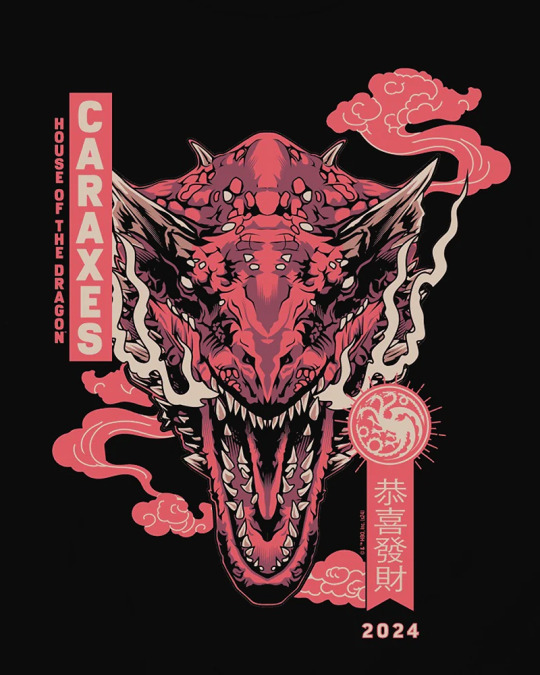


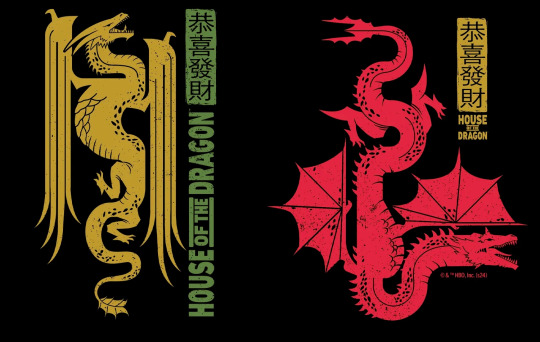

Art of Caraxes, Syrax, and Vhagar for the Year of the Dragon, from WB’s House of the Dragon merchandise shop.
#image#art#merchandise#House of the Dragon#Caraxes#Syrax#Vhagar#Lunar New Year#Year of the Dragon#dragon
242 notes
·
View notes
Text
The Golden Dragon of the Yulong River in Guilin, China | source
11K notes
·
View notes
Text

'For even the Jade Emperor was surprised when the Dragon came in fifth place, for it was busy rescuing the rabbit that had fallen into the river'
Happy New Year everyone!
648 notes
·
View notes